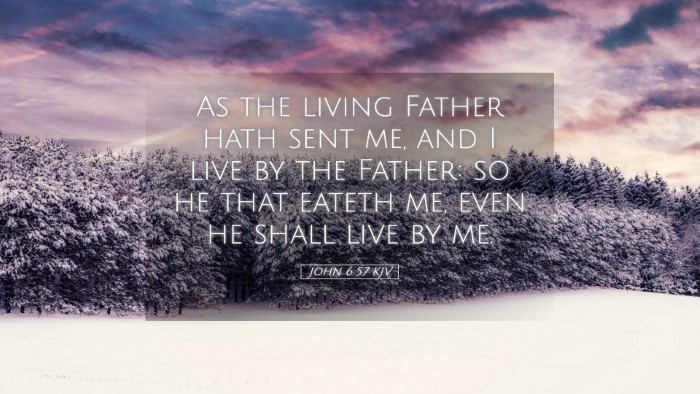Commentary on John 6:57
Text of John 6:57: "As the living Father hath sent me, and I live by the Father: so he that eateth me, even he shall live by me."
Introduction
The verse in John 6:57 is pivotal in understanding the nature of the relationship between Jesus and His followers. It encapsulates the profound truth regarding spiritual life and sustenance drawn from Christ. This commentary seeks to unpack the rich theological implications of this verse, integrating insights from eminent public domain commentaries.
The Context of John 6
The chapter encapsulates a vital discourse following the miraculous feeding of the five thousand. Christ employs this miraculous sign to depict deeper spiritual truths concerning His identity as the Bread of Life. This teaching shifts the focus from physical sustenance to spiritual nourishment, preparing the hearts of His listeners to understand the gravity of consuming the "flesh" and "blood" of the Son of Man.
Insights from Matthew Henry
Understanding the Union with the Father
Henry emphasizes the unity of purpose and essence between Jesus and the Father. He notes that just as the Father imparts spiritual life to the Son, so does the Son impart life to believers. The statement "I live by the Father" highlights that Jesus’ existence and sustenance are reliant on the Father, embodying a heavenly model for believers. Their life is dependent on their relationship with Christ.
The Act of Eating
Henry interprets "eating" as an intimate communion with Christ. This is more than mere physical ingestion; it represents belief and acceptance of Christ’s sacrificial role. As the body absorbs food for nourishment, so believers must absorb the teachings and sacrifice of Christ for spiritual nourishment. This communion assures eternal life, a theme prevalent throughout John’s Gospel.
Insights from Albert Barnes
The Living Father
Barnes elaborates on the phrase "as the living Father." He underscores the active and sustaining nature of God the Father, whose life is uncreated and self-sustaining. This idea is crucial as it sets the tone for understanding the life that comes through the Son. The analogy stresses that believers rely on Christ in the same way that Christ relies on the Father.
Life Through Christ
Barnes speaks to the meaning of "he that eateth me shall live by me." He explains that faith in Christ is not a mere intellectual assent but a vital relationship that brings about sustenance for the spiritual life. It is living in a state of dependence upon Him, allowing His virtues to be integrated into the believer's life, thus producing spiritual health and vitality. Each believer is sustained and invigorated by their ongoing relationship with the Living Lord.
Insights from Adam Clarke
Spiritual Transformation
Clarke highlights the transformational aspect of partaking in Christ. He notes that just as food becomes part of the body, so does partaking in Christ's essence lead to spiritual vitalization. This metaphor conveys the idea that true life (zoe) comes not from the material realm but from a mystical union with Jesus. Clarke calls attention to the necessity of this union for the believer’s spiritual existence and growth.
Comparative Theology
Moreover, Clarke draws comparisons between the spiritual sustenance from Christ and the Old Testament references to Manna. While Manna provided temporary sustenance, Christ, as the Bread of Life, provides eternal nourishment, leading to everlasting life. This illustrates the continuity of God’s redemptive plan, where Jesus fulfills the prophetic nuances of the Hebrew Scriptures.
Theological Implications
- Christocentric Life: This verse emphasizes that the life of a believer is inherently Christ-centered; it calls each follower to continuously seek nourishment from Jesus, paralleling the dependence of Christ on the Father.
- Interdependence of the Godhead: The verse underlines the interplay between the Father and the Son, establishing a model for divine interaction that reflects love, dependence, and the outpouring of life.
- Eschatological Promise: The promise that believers shall 'live by me' points to eschatological assurance – not only during earthly life but extending into the eternal realm, which finds fulfillment in the resurrection.
Application for Pastors and Theologians
This verse serves as an exhortation for pastoral ministry. It calls for a reliance on Christ that transcends ritualism and breaks into the very fabric of daily life. For theologians, John 6:57 invites deeper inquiry into Christology and soteriology, prompting reflection on how believers continue to engage with the sacrificial nature of Christ's death and resurrection.
Encouragement for Believers: This verse should be a source of encouragement for believers, reminding them of their source of life in Christ. As they 'eat' and 'drink' in faith, they participate in a divine sustenance that nourishes their spiritual walk, ensuring they thrive in their relationship with God.
Conclusion
In summary, John 6:57 encapsulates profound truths about the dependency of Christ on the Father and the consequent life-giving relationship between believers and Christ. Through the insights of Matthew Henry, Albert Barnes, and Adam Clarke, it becomes clear that this verse calls for a deep, transformative engagement with the life of Christ. As both a challenge and a promise, it assures believers of the eternal nourishment found in their ongoing relationship with Jesus, the Bread of Life.


